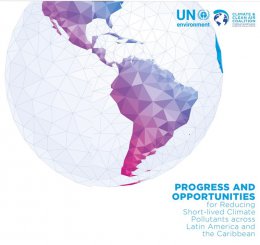Progress and opportunities for reducing short-lived climate pollutants across Latin America and the Caribbean
Progress and opportunities for reducing short-lived climate pollutants across Latin America and the Caribbean

This technical report, Progress and Opportunities of Reducing Short-lived Climate Pollutants across Latin America and the Caribbean, reviews examples of initiatives and measures that have successfully reduced emissions of black carbon, methane and some hydrofluorocarbons in Latin America and the Caribbean, the three short-lived climate pollutants (SLCPs) considered by the Climate and Clean Air Coalition. The report addresses the feasibility of implementing the identified measures and policies in key sectors that could be replicated or scaled up to achieve air quality improvement and near-term climate protection. As demonstrated in this report, countries in Latin America and the Caribbean region have made significant progress in reducing the emissions from key sectors of short-lived climate pollutants through a small number of identified measures. The governments across the region have the opportunity to achieve lasting benefits for public health, the environment and climate by creating an enabling environment for wider implementation of the identified measures through effective legal and institutional frameworks, appropriate public-private partnerships, economic incentives, and dedicated research and development. More rapid and wider implementation of the identified measures in the region can lead to improved agricultural competitiveness and food security, reduced damages from cumulative effects such as sea-level rise, melting rate of glaciers, and biodiversity loss in the region, as well as provide better air quality for the citizens, especially women, children and the poor.







